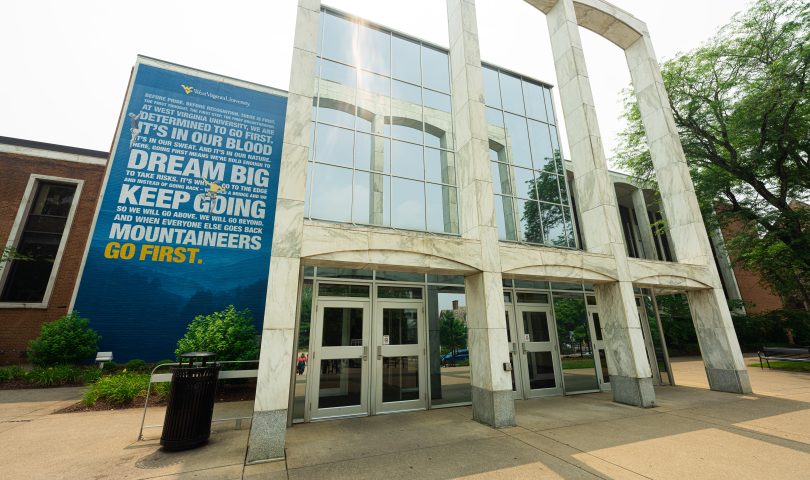MORGANTOWN – WVU President Gordon Gee talked to members of the West Virginia Chamber of Commerce on Thursday about the university’s Academic Transformation and its $45 million deficit.
“Higher education has to change fundamentally,” he said, and he’s chronicled that in his new book, “Change or Die.”
Gee said, “We are in an existential crisis in higher education in many ways.”
Gee’s remarks came during a panel discussion at the chamber’s annual conference, held at the Greenbrier and titled, Creating Connections, Building the Future.
The discussion, Investing in the Next Generation, included Gee; Marty Roth, president of the University of Charleston; and Jim Nemitz, president of the West Virginia School of Osteopathic Medicine.
The crisis, Gee said, has three parts. One is serious financial issues. And that includes not just taxpayer support but overcharging tuition and a variety of other things that have extended beyond university boundaries.
Two is that in 2008, he said, “people stopped having children.” This has led to the 25% demographic cliff often referred to.
Three, he said, is the changing perception of higher education. When he first became WVU president in 1981, a Gallup poll showed that 96% of Americans thought higher education was a good thing. Now it’s 36% and going south.
“Universities and colleges have lost the trust and support of the American people. We’ve got to regain that,” he said, “We are here to serve the people of West Virginia.” That means serving students and listening carefully. “We want to be an institution that is for the people rather than telling the people what they should think.”
Nemitz said WVSOM is committed to serving the state first and foremost. “You’ve got to take care of your students. Medical students are strong and competitive but still need nurturing and care.” And the school offers resources to enable them to be successful.
Roth said education is a service business. And while students are customers, they have challenges and struggles. So even though they’ve paid for the education service, universities have to do what they can to make students successful. At U of C, that means regular progress checks on students’ attendance and academic performance so any problems can be triaged.
Gee said transformation at WVU began back in 2014 when he first arrived for his second term; it began on the nonacademic side and is now focused on academics.
He listed three areas of focus. One is put students first. “They are the reason we are here.” They are seeking a great education and a great purpose in life.
Two is WVU’s land grant mission: community building, collaboration, creating jobs and prosperity.
Three is, “How do we differentiate ourselves? We can’t be everything.”
But at the end of the process, he said, they’ll still have 300 programs, and still be one of most comprehensive academic centers in the country. They will have strengthened certain areas, such as forensics, neuroscience and medical education.
Gee took a question about where higher education will be in five to 10 years.
It will be more robust, he said.
“AI will be our great friend if we can learn how to control it.” Education must serve the whole population from pre-K to adults.
Universities will offer micro-credentialing (defined by Oregon State University as a series of courses that culminate in a digital badge from an accredited university to let employers and your professional network know that you have proficiency in a subject area). And they will offer a variety of certifications in addition to traditional academics.
“I believe that the future of higher education is very bright,” he said. “I think that we just need to get through this moment where we are looking too much through the rear-view mirror and not enough through the windshield.”
Before the panel discussion, Paul Rady CEO and president of Antero Resources and Antero Midstream took the stage with Gee to announce a $4 million gift from Antero to WVU’s Statler College of Engineering and Mineral Resources.
The college was among those subject to program review and the provost’s initial recommendation was to cut 12 faculty positions, leaving 47. Among the recommendations was to merge the Mining Engineering/Petroleum and Natural Gas Engineering programs and cut one faculty post, leaving five intact.
Rady said the gift, the largest in Antero’s history, will be for the petroleum and natural gas engineering programs for a named student success endowment, a named professorship in petroleum and natural gas engineering, an energy opportunity fund, a named graduate studies program for upstream coursework, and a new master’s in midstream engineering program.
“We know the future is bright for natural gas development and we know the future is bright for WVU,” he said.
Gee said, “I think Antero is one of those quiet companies that has a big impact. The best is yet to come. The university wants to be very much a part of this.” The future of the natural gas and petroleum industries in West Virginia and across the nation “is absolutely essential.”
Email: dbeard@dominionpost.com




